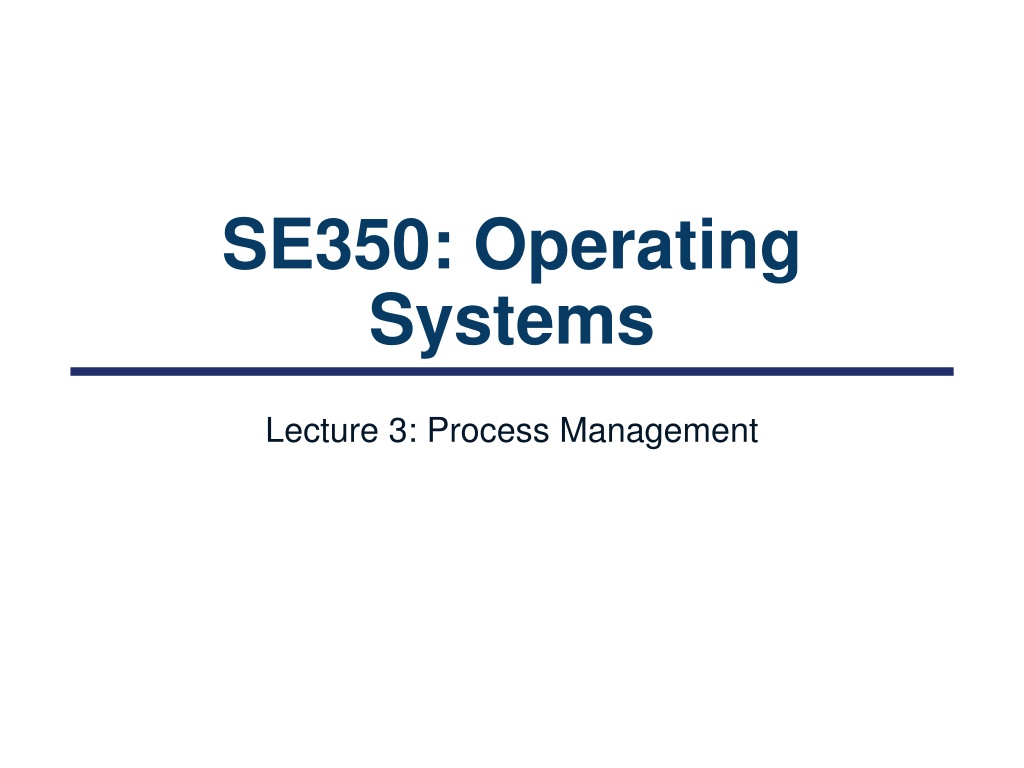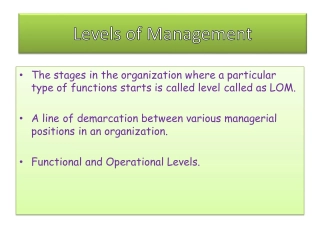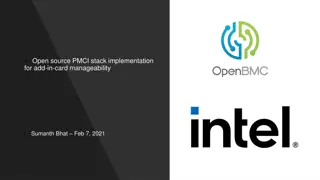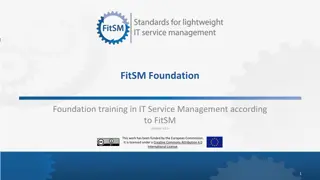
Process Management in Operating Systems
This content delves into process management in operating systems, covering topics such as safe control transfer, mode switching, process creation, and mode transfer mechanisms. It discusses the implementation of safe mode transfers, the need for separate kernel stacks, and provides a detailed stack example. Emphasis is placed on the mechanisms that enable efficient and secure process handling within an operating system.
Download Presentation

Please find below an Image/Link to download the presentation.
The content on the website is provided AS IS for your information and personal use only. It may not be sold, licensed, or shared on other websites without obtaining consent from the author. If you encounter any issues during the download, it is possible that the publisher has removed the file from their server.
You are allowed to download the files provided on this website for personal or commercial use, subject to the condition that they are used lawfully. All files are the property of their respective owners.
The content on the website is provided AS IS for your information and personal use only. It may not be sold, licensed, or shared on other websites without obtaining consent from the author.
E N D
Presentation Transcript
SE350: Operating Systems Lecture 3: Process Management
Outline Safe control transfer How do we switch from one mode to the other? What should hardware provide? Native control of process Can processes create other processes? fork(), exec(), wait(), signal()
Recall: Three Types of Mode Transfer Syscall Process requests system service, e.g., exit Like function call, but outside process Process does not have address of system function to call Like a Remote Procedure Call (RPC) for later OS marshalls syscall id and args in registers and exec syscall Interrupt External asynchronous event triggers context switch, e. g., Timer, I/O device Independent of user process Trap or exception Internal synchronous event in process triggers context switch, e.g., protection violation (segmentation fault), divide by zero,
Implementing Safe Mode Transfers It should be impossible for buggy or malicious user program to cause kernel to corrupt itself Controlled transfer into kernel (e.g., interrupt vector table) Separate kernel stack Carefully constructed kernel code should pack up user process state and set it aside Details depend on the machine architecture
Need for Separate Kernel Stacks Kernel cannot put anything on user stack (Why?) Reliability: what if user program s SP is not valid? Security: what if other threads in user process change kernel s return address? Two-stack model Kernel keeps separate stack for each thread in kernel memory (in addition to user stack in user memory)
Stack Example Stack Pointer tmp = 1 ret = ext A0: A(int tmp) { A1: if (tmp<2) A2: B(); A3: printf(tmp); A4: } B0: B() { B1: C(); B2: } C0: C() { C1: A(2); C2: } Stack holds temporary results A(1); Permits recursive execution ext: Crucial to modern languages
Stack Example Stack Pointer tmp = 1 ret = ext A0: A(int tmp) { A1: if (tmp<2) A2: B(); A3: printf(tmp); A4: } B0: B() { B1: C(); B2: } C0: C() { C1: A(2); C2: } Stack holds temporary results A(1); Permits recursive execution ext: Crucial to modern languages
Stack Example Stack Pointer tmp = 1 ret = ext A0: A(int tmp) { A1: if (tmp<2) A2: B(); A3: printf(tmp); A4: } B0: B() { B1: C(); B2: } C0: C() { C1: A(2); C2: } Stack holds temporary results A(1); Permits recursive execution ext: Crucial to modern languages
Stack Example tmp = 1 ret = ext A0: A(int tmp) { Stack Pointer A1: if (tmp<2) ret = A3 A2: B(); A3: printf(tmp); A4: } B0: B() { B1: C(); B2: } C0: C() { C1: A(2); C2: } Stack holds temporary results A(1); Permits recursive execution ext: Crucial to modern languages
Stack Example tmp = 1 ret = ext A0: A(int tmp) { A1: if (tmp<2) ret = A3 Stack Pointer A2: B(); ret = B2 A3: printf(tmp); A4: } B0: B() { B1: C(); B2: } C0: C() { C1: A(2); C2: } Stack holds temporary results A(1); Permits recursive execution ext: Crucial to modern languages
Stack Example tmp = 1 ret = ext A0: A(int tmp) { A1: if (tmp<2) ret = A3 A2: B(); ret = B2 A3: printf(tmp); Stack Pointer tmp = 2 ret = C2 A4: } B0: B() { B1: C(); B2: } C0: C() { C1: A(2); C2: } Stack holds temporary results A(1); Permits recursive execution ext: Crucial to modern languages
Stack Example tmp = 1 ret = ext A0: A(int tmp) { A1: if (tmp<2) ret = A3 A2: B(); ret = B2 A3: printf(tmp); Stack Pointer tmp = 2 ret = C2 A4: } B0: B() { B1: C(); B2: } > 2 C0: C() { C1: A(2); C2: } Stack holds temporary results A(1); Permits recursive execution ext: Crucial to modern languages
Stack Example tmp = 1 ret = ext A0: A(int tmp) { A1: if (tmp<2) ret = A3 A2: B(); ret = B2 A3: printf(tmp); Stack Pointer tmp = 2 ret = C2 A4: } B0: B() { B1: C(); B2: } > 2 C0: C() { C1: A(2); C2: } Stack holds temporary results A(1); Permits recursive execution ext: Crucial to modern languages
Stack Example tmp = 1 ret = ext A0: A(int tmp) { A1: if (tmp<2) ret = A3 Stack Pointer A2: B(); ret = B2 A3: printf(tmp); A4: } B0: B() { B1: C(); B2: } > 2 C0: C() { C1: A(2); C2: } Stack holds temporary results A(1); Permits recursive execution ext: Crucial to modern languages
Stack Example tmp = 1 ret = ext A0: A(int tmp) { Stack Pointer A1: if (tmp<2) ret = A3 A2: B(); A3: printf(tmp); A4: } B0: B() { B1: C(); B2: } > 2 C0: C() { C1: A(2); C2: } Stack holds temporary results A(1); Permits recursive execution ext: Crucial to modern languages
Stack Example Stack Pointer tmp = 1 ret = ext A0: A(int tmp) { A1: if (tmp<2) A2: B(); A3: printf(tmp); A4: } B0: B() { B1: C(); B2: } > 21 C0: C() { C1: A(2); C2: } Stack holds temporary results A(1); Permits recursive execution ext: Crucial to modern languages
Stack Example Stack Pointer tmp = 1 ret = ext A0: A(int tmp) { A1: if (tmp<2) A2: B(); A3: printf(tmp); A4: } B0: B() { B1: C(); B2: } > 21 C0: C() { C1: A(2); C2: } Stack holds temporary results A(1); Permits recursive execution ext: Crucial to modern languages
Stack Example A0: A(int tmp) { A1: if (tmp<2) A2: B(); A3: printf(tmp); A4: } B0: B() { B1: C(); B2: } > 21 C0: C() { C1: A(2); C2: } Stack holds temporary results A(1); Permits recursive execution ext: Crucial to modern languages
Two-Stack Model Running Handling syscall Ready to run main main main Proc1 Proc1 Proc1 Proc2 Proc2 Proc2 User stack syscall syscall user CPU state user CPU state syscall handler Kernel stack I/O driver
Interrupt Masking Interrupt handler runs with interrupts off Re-enabled when interrupt completes OS kernel can also turn interrupts off E.g., when determining next process/thread to run On x86 cli: disable interrupts sti: enable interrupts Only applies to current CPU (on a multicore) We will need this to implement synchronization (more on this later)
Atomic Transfer of Control Kernel handler() { pushad; } Processor Registers PC SP Kernel stack EFLAGS foo() { while ( ) { x = x + 1; y = y 2; } } Other Regs EAX, EXB, User-level process User stack foo
Atomic Transfer of Control (cont.) Kernel Single instruction to Save some registers (e.g., SP, PC) Change PC and SP Switch Kernel/user mode handler() { pushad; } Processor Registers PC SP Kernel stack EFLAGS foo() { while ( ) { x = x + 1; y = y 2; } } Other Regs EAX, EXB, User-level process Error User stack PC EFLAGS foo SP
Atomic Transfer of Control (cont.) Kernel Single instruction to save all registers handler() { pushad; } Why is stack pointer saved twice? Hint: are they the same? Processor Registers PC SP Kernel stack EFLAGS foo() { while ( ) { x = x + 1; y = y 2; } } Other Regs EAX, EXB, User-level process All Regs EXB EXA SP Error User stack PC EFLAGS foo SP
Kernel System Call Handler Vector through well-defined syscall entry points! Table mapping system call number to handler Locate arguments In registers or on user (!) stack Copy arguments (copy before check) From user memory into kernel memory Protect kernel from malicious code evading checks Validate arguments Protect kernel from errors in user code Copy results back Into user memory
At the End of Handler Handler restores saved registers Atomically return to (interrupted) process/thread Restore PC, SP Restore processor status Switch to user mode
How Does Kernel Provide Services? You said that applications request services from the operating system via syscall, but I ve been writing all sort of useful applications and I never ever saw a syscall !!! That s right It was buried in the programming language runtime library (e.g., libc.a) Layering
OS Run-Time Library Proc 2 Proc n Proc 1 OS Proc 2 Proc n Proc 1 OS Library OS Library OS Library OS
Kernel to User Mode Switch New process/new thread start Jump to first instruction in program/thread Return from interrupt, exception, system call Resume suspended execution Process/thread context switch Resume some other process User-level upcall (UNIX signal) Asynchronous notification to user program Preemptive user-level threads Asynchronous I/O notification Interprocess communication User-level excepting handling User-level resource allocation
Putting it Together: Web Server Request Reply (retrieved by web server) Client Web Server
Putting it Together: Web Server (cont.) 4. parse request 9. format reply Server request buffer reply buffer 10. network socket write 1.network socket read 3. kernel copy 5. file read 8. kernel copy syscall syscall RTU RTU Kernel 11. kernel copy from user buffer to network buffer wait interrupt interrupt 2. copy arriving packet (DMA) 12. format outgoing packet and DMA 6. disk request 7. disk data (DMA) Hardware Network interface Disk interface Request Reply
Summary of Hardware Support for OS Privilege modes Privileged instructions Memory translation Processor exceptions Timer interrupts Device interrupts Interprocessor interrupts Interrupt masking System calls Return from interrupt
Can a Process Create a Process ? fork() system call creates copy of current process with new unique process ID (PID) Return value from fork() is integer When > 0 Running in (original) parent process return value is PID of new child When = 0 Running in new child process When < 0 Error! Must be handled somehow Running in original process All state of original process duplicated in both parent and child! Memory, file descriptors (more on this later), etc
UNIX Process Management pid = fork(); if (pid == 0) exec(...); else wait(pid); main () { ... fork exec } pid = fork(); if (pid == 0) exec(...); else wait(pid); pid = fork(); if (pid == 0) exec(...); else wait(pid); wait
UNIX Process Management (cont.) fork() Syscall to create copy of current process and start it exec() Syscall to change program being run by current process wait() Syscall to wait for process to finish signal() Syscall to send notification to another process (e.g., SIGKILL, SIGINT)
Example #include <stdlib.h> #include <stdio.h> #include <string.h> #include <unistd.h> #include <sys/types.h> int main(int argc, char *argv[]) { pid_t cpid, mypid; pid_t pid = getpid(); printf("Parent pid: %d\n", pid); cpid = fork(); if (cpid > 0) { mypid = getpid(); printf("[%d] parent of [%d]\n", mypid, cpid); } else if (cpid == 0) { mypid = getpid(); printf("[%d] child\n", mypid); } else { perror("Fork failed"); exit(1); } exit(0); } /* get current processes PID */ /* Parent Process */ /* Child Process */
Implementing a Shell 1. char *prog, **args; 2. int child_pid; 3. // Read and parse the input a line at a time 4. while (readAndParseCmdLine(&prog, &args)) { 5. child_pid = fork(); // create a child process 6. if (child_pid == 0) { 7. exec(prog, args); 8. // NOT REACHED 9. } else { 10. wait(child_pid); // I'm the parent, wait for child 11. return 0; 12. } 13.} // I'm the child process. Run program
Summary Safe control transfer How do we switch from one mode to the other? What should hardware provide? Native control of process Can processes create other processes? fork(), exec(), wait(), signal()
Feedback https://forms.gle/L6oS18zZApNF3ERb8 Will be available until the end of term Will be checked regularly
Questions? globaldigitalcitizen.org
Acknowledgment Slides by courtesy of Anderson, Culler, Stoica, Silberschatz, Joseph, and Canny






















